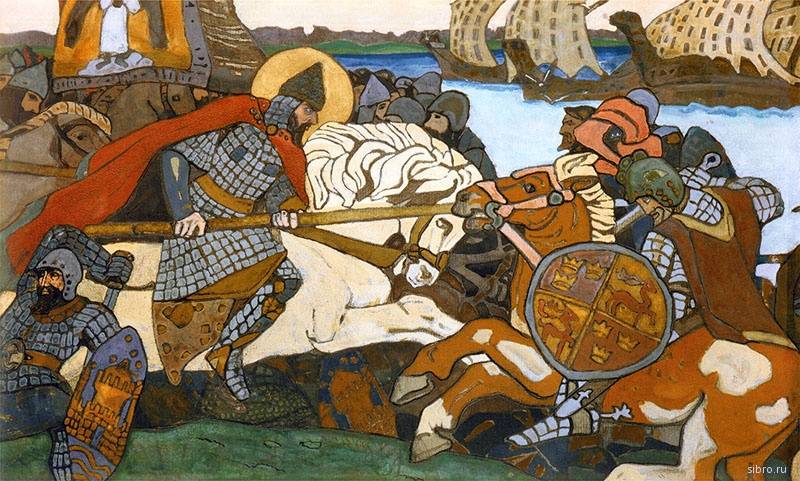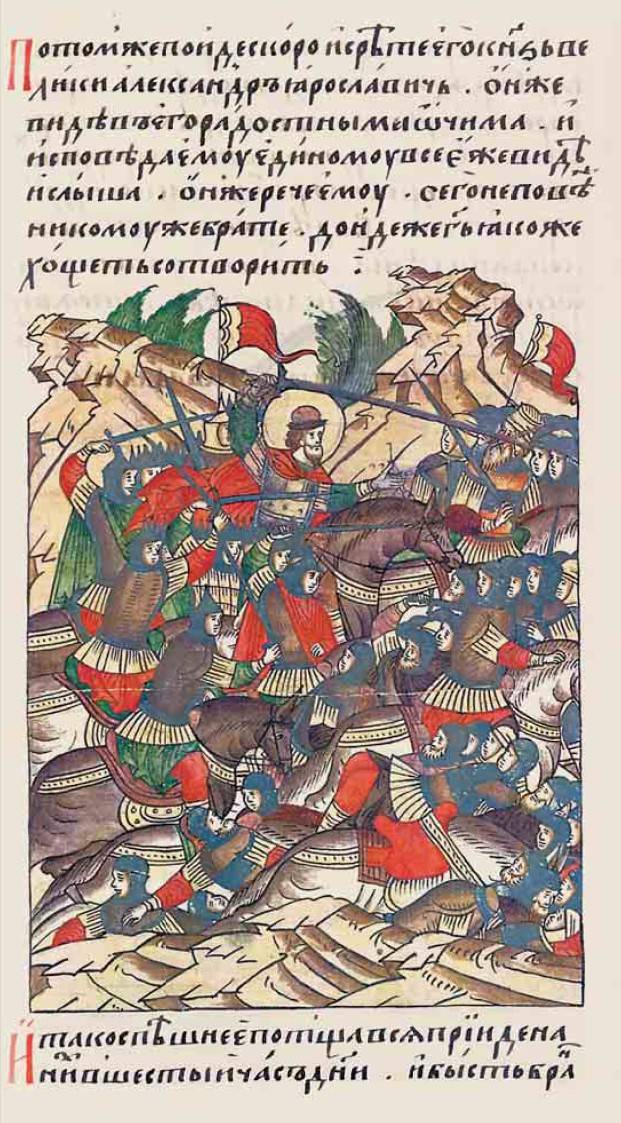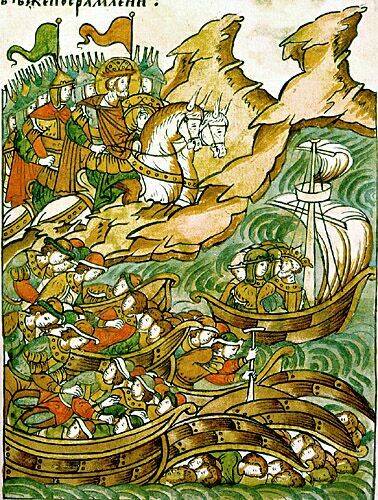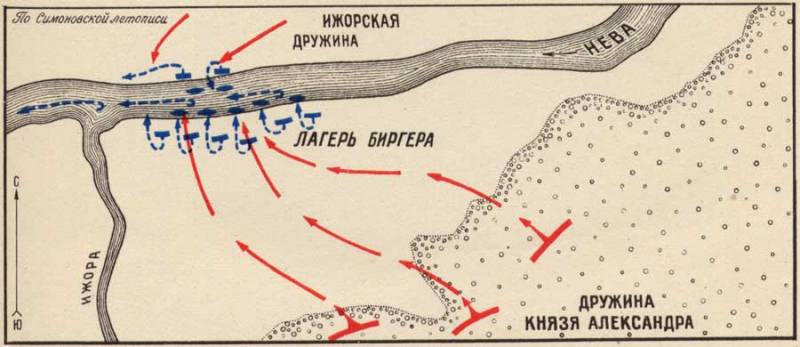"God is not in strength, but in truth!" How Alexander Yaroslavich defeated the Swedish crusaders

780 years ago, on July 15, 1240, Alexander Yaroslavich with his retinue defeated the Swedish knights invading our lands. Whoever comes to us with a sword will perish by the sword!
Northwest frontier of Russia
On the Baltic side, various clashes and wars were commonplace. First, the Baltic states, Karelia were the outskirts of Russia. During the period of feudal fragmentation, this region was in the sphere of influence of the Lord Novgorod the Great. Novgorodians in the XI-XII centuries. actively colonized the western, northern and eastern lands. In the future Estonia, the Russians founded Kolyvan (later Revel-Tallinn). Novgorodians populated the banks of the river. Neva to the mouth. Most of the Finno-Ugric tribes of modern Finland and Karelia paid tribute to Novgorod.
In the same period, the expansion of the Swedes began. At first, the Swedes made occasional raids on Novgorod lands, attacked merchant ships. Karelians and Russes answered the same. By 1160, an internal retrenchment ended in Sweden, the feudal war for power, the struggle of Christians and pagans. After that, the Swedes began a new stage of expansion - systematic campaigns and colonization. In particular, in 1164, the Swedish army tried to take Ladoga. The Ladozhans stayed in the Kremlin and moved to the Voronoi river (flows into Lake Ladoga), where they built a fortification. However, the Novgorod army defeated the finds. The Russians also struck back. In 1187, a Novgorod, Izhora, and Karelian army took and burned the Swedish capital Sigtuna with a sudden blow. After this pogrom, the Swedes did not begin to restore the old capital and built a new one - Stockholm.
It is worth noting that Russian and Swedish (as well as German, Danish) colonizations were fundamentally different. Naturally, Russian colonization was not only peaceful. There were armed clashes and coercion. However, the Russians did not suppress local tribes, did not turn local residents into slaves, did not consider them to be "subhuman." The introduction was almost painless. The territory was huge, everyone was missing an animal and fish. The tribute was small, the Orthodox Church acted relatively sluggishly and peacefully. The Russians were notable for their tolerance; Novgorodians themselves at that time were either pagans or dualists - they worshiped both Christ and Perun. Therefore, the Novgorodians did not have castles and fortresses in the area of the river. Neva, in Karelia and southern Finland. As a result, all locals became equal inhabitants of the Russian land, were not considered "second-class people."
The Swedes and Germans colonized Finland and the Baltic states according to a strict scenario. Lands were captured, devastated, and strong points were built - castles and fortresses. Knights and their retinue lived in them. The surrounding population enslaved, enslaved, forcibly Christianized. The natives who opposed slavery and the "holy faith" were physically destroyed. They killed as hard as possible so that others would not be disgraceful. In particular, they burned alive. As a result, for many centuries a slave system has developed, where there are gentlemen and "subhuman" slaves.
The threat from the West
How did the Western knights get to Pskov and Novgorod? During the time of the Russian princes Oleg Veshchy and Igor Stary, the vast territory between Novgorod and the Frankish kingdom was occupied by the Slavic-Russian (so-called Western Slavs) and Lithuanian tribes, who had just stood out from the Baltic-Slavic community and worshiped Perun, had the same spiritual and material traditions as the Russians.
This war of the West with the North has almost been forgotten. For several hundred years, a fierce and bloody struggle took place. The Roman throne sent the crusaders to the North and East. The West used the ancient divide and conquer strategy. Slavic tribes and lands were destroyed, enslaved, assimilated, Christianized and partially driven out to the east. "Slavic Atlantis" in the center of Europe was destroyed ("Slavic Atlantis" in Central Europe) Few people now know that present-day Germany, Austria, Denmark, the countries of Scandinavia, partly Northern Italy are created on Slavic bones and heritage. That the current Germans are for the most part Slavs who are assimilated, who have forgotten the language, traditions and culture.
In the occupied lands, the Western knights and clergy carried out violent Christianization, converted previously free people into serf slaves or destroyed them. In some areas, the Slavs-Russians exterminated without exception. They were hunted like wild animals. Many Slavs fled further east. In particular, many moved to the lands of Lithuania, and Lithuanian tribes received a significant Slavic impurity. The remaining Slavs were resettled from their fertile convenient lands, driven into marshes, where it was possible to live mainly only by fishing. Knights, large feudal lords, bishops and monasteries enslaved Christianized Slavs. The rebellious systematically exterminated. Developed "law-abiding." In exchange, peasants were resettled from more western territories, where the corresponding processing took place centuries earlier.
The Catholic Church and German feudal lords pursued the language and customs of the conquered Slavic tribes. Destroyed their culture and traditions. True, the Slavs showed tremendous resistance to these destructive processes. Only in the XNUMXth century during the devastating Thirty Years War did the Slavic element finally be uprooted. Only miserable remnants remained.
In the XII century, the Germans began expansion in the Baltic states. First, a trading post was established at the mouth of the Western Dvina. Then came the missionaries with the warriors. They preached among the Baltic tribes "with fire and sword." Churches were erected on steep hills and strategic heights; stone walls with towers were erected to protect them. Despite this, the Livs did not want to be baptized and pay tithing to Rome. Then the Germans organized a crusade and betrayed Livonia to the fire and sword. The Livs continued to resist. Then Bishop Albert founded Riga at the mouth of the Neva in 1200. Also on his initiative in 1202 they created the Order of the Knights of the Sword, which settled in the Wenden fortress.
Subduing Livonia, the German knights moved to Russia. Thus, a terrible threat loomed over Russian land, which was going through a period of fragmentation. The eastern core of the Rus could repeat the fate of their brothers in Central Europe. The princes of Polotsk did not realize the threat posed by the Western knights in time. The Crusaders moved east, began to take the lower lands from the Principality of Polotsk. At the same time, the Westerners acted not only with the sword, but also with the carrot. They negotiated, persuaded, for some time paid tribute to Polotsk for Livonian lands, “helped” against Lithuania, etc. In 1213, the Germans captured the city of Bear Mountain in the lands of Chud (the ancestors of the current Estonians). And the Peipsi land was included in the sphere of influence of Novgorod.
Since that time, wars of knights against Pskov and Novgorod began. In 1224, after a long siege, the crusaders stormed the strategic stronghold of the Russians in Estonia - Yuryev. The garrison led by Prince Vyacheslav Borisovich and killed all the townspeople. The Rusichs more than once cruelly defeated the enemy, but in the conditions of fragmentation of the Russian land, this struggle would sooner or later be lost. “Onslaught to the East” was systematic, conducted systematically, according to a clear strategy of enslavement. For eight centuries, the Germans, Danes, Swedes and the Roman throne made the Baltic region a battlefield. In the Russian principalities and lands, under one prince, enemies were beaten, while under the other, they listened, pursued a “flexible policy”. The Western Crusaders treated the Christian Rus in much the same way as the Gentile Baltic. For them, the Russians were heretics who needed to be christened in the correct faith or exterminated.

Battle of the Neva
One of the first who realized the threat from the West was Prince Yaroslav Vsevolodovich, the son of Vsevolod the Big Nest, the father of Alexander Nevsky. His capital city was Pereyaslavl-Zalessky. In 1228, the Novgorodians called on Yaroslav to reign over. He was preparing a campaign to Riga, but quarreled with the Pskov and Novgorod residents. In 1234, Yaroslav defeated the Germans at Yuryev-Derpt and pronounced the Yuryevsky tribute from the enemy for himself and his successors. The famous tribute that Ivan the Terrible used to start a war with the goal of returning the Baltic states to Russia.
At this time, the threat from the West increased significantly. The Order of the Swordsmen in 1237 was combined with the more powerful Teutonic Order, which settled on parts of Polish lands and in Prussia. The lands of Prussians-Prussians (Slavs-Russians) were captured, most of the population was exterminated, the remaining ones turned into slaves. The Crusaders were preparing a blow to Russia. They hoped to take advantage of the favorable situation. In 1237-1240. Russia was subjected to a terrible invasion from the East. Hordes came - "Mongols" (The myth of the "Mongol-Tatar" invasion; The myth of the "Mongols from Mongolia" is the Vatican’s most grandiose provocation against Russia) Russia was devastated, its military-economic and human potential was significantly weakened. Russian principalities fell under the power of the Golden Horde.
The Roman throne decided to use the weakening of the central principalities of Russia to capture the Russian North - Pskov and Novgorod. In 1237, Rome proclaimed a second crusade in Finland. In 1238, the Danish and Teutonic knights agreed on joint actions in Estonia and against Russia. Swedish feudal lords joined the alliance. In the summer of 1240, large Swedish feudal lords Jarl Birger and Ulf Fasi gathered troops (according to various sources, from 1 to 5 thousand soldiers) and landed at the mouth of the Neva. With the army arrived bishops. The Swedes planned to subjugate the Izhora and Vodskaya lands, where the Vod and Izhora tribes, which were part of the Novgorod land, lived. Establish a fortress at the mouth of the Neva, and then strike at Novgorod. At the same time, a crusader attack from the west was being prepared, and the Swedes knew about it.
Since 1236, the young prince Alexander Yaroslavich served (was the head of the army) in Novgorod. The enemy was discovered by the Novgorod “marine guard” - Izhora, led by Elder Pelugiy (Pelgusius). Izhora discovered the appearance of the Swedes and reported to Novgorod. Obviously, then there was a system of operational communications from the mouth of the Neva to Novgorod (signal lights on the hills, possibly a horse relay). Then the brave Izhora guards watched the landed enemy. Prince Alexander did not wait for the gathering of the Novgorod rati, gathered a personal squad and moved on horseback and on boats along Volkhov. A group of Novgorod volunteers also spoke with him. In Ladoga joined the local squad. As a result, Alexander had about 300 professional fighters - combatants and about 1000 thousand warriors. Only 1300-1400 soldiers.
The Swedes did not know about the approach of the enemy. They were confident in their abilities and settled down to rest on the southern bank of the Neva, near the confluence of the Izhora River. On July 15, 1240, the Russians attacked the enemy. The attack was sudden. The Swedes controlled the waterway, but did not wait for an attack from land. The foot soldiers attacked along the coast to cut off the enemy from the ships, the cavalry hit the center of the camp to close the encirclement. Prince Alexander personally wounded Jarl Birger with a spear. Sources described the exploits of several warriors: Gavrilo Oleksich, riding a horse on an enemy ship, chopped down the Swedes. He was thrown into the water, but he survived and again entered the battle, defeated one of the enemy governors. Novgorodian Misha with his squad attacked the Swedish ships and captured three of them. The squad of Savva broke into the tent of the Swedish commander and hooked the pillar. The fall of the golden-domed tent of the Swedish leader inspired the Russian warriors. Novgorodian Sbyslav Yakunovich cut down many enemies with an ax. Ratmir, close to Alexander, fought several enemies at once and died the death of the brave.
Stunned by the sudden attack, the leader’s wound, the Swedes faltered and fled. With the onset of darkness, the Swedish squadron went to sea. By order of Alexander, two captured ships (augers) loaded the bodies of the killed Swedes, they were allowed to go along the river and “sink into the sea”. The rest of the killed, apparently simple warriors and servants from the Finnish tribes, sum and em, were buried "having swept them into the nude without a number." Officially, the Russian army lost 20 soldiers. The loss of 20 professional combatants in a surprise attack is serious. In addition, the soldiers of Izhora participated in the battle. They were pagans and burned the bodies of their fallen tribesmen. Therefore, their losses were unlikely to be noted in the sources.
The Neva battle was a good lesson for the Swedish feudal lords. At the time of a terrible threat to Russia, the people saw in the young prince their defender. "God is not in strength, but in truth!" True, with freedom-loving Novgorodians it was difficult. Soon, Novgorod quarreled with the prince, and he went to his inheritance - Pereslavl-Zalessky. But Novgorodians chose the time for a swara unsuccessfully. In the same 1240, the crusaders launched a large offensive against Russia. The swordsmen took Izborsk, defeated the Pskov army and captured Pskov. Great danger loomed over Novgorod itself.

- Alexander Samsonov
- https://ru.wikipedia.org/ https://runivers.ru/

Information